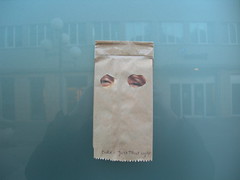I have been thinking a lot about the merits and drawbacks to anonymity on the web.
First, in a teleconference that we held for PRSA on the topic of Social Media this week, Scott Baradell, who was also on the call along with Constantin Basturea, said that he felt that by just cutting out anonymous comments on a blog, or other service, you could avoid 90 percent of the problems with people that are out to just out to inflict grief.
Second, I was listening to NPR today and they are having one of their infamous pledge drives. Neal Conan, host of Talk of the Nation, said something that struck me. He said that his program tries to present all sides of the argument while maintaining civil tone, so that you can actually hear what people are saying.
Third, I read an excellent post by Leo Bottary about Managing Conflict, in which he conjures up no less than Abraham Lincoln. From the book Lincoln on Leadership, he quotes: “[Lincoln] managed his darker side by displaying his outrage only in private, writing long letters to vent his anger and emotion, avoiding conflict whenever possible, and never quarreling over insignificant matters.”
Finally, I have been doing some exploration in the peer-to-peer gaming network Second Life. I have been learning about its culture, economy and the marketing and PR potential it holds. But one thing that troubles me about Second Life has been its anonymity. Mostly because I am personally uncomfortable with not knowing who I am talking with since it’s harder to get a sense of their true motives. The game itself has started to have problems with what they call griefers, one gamer wrote about how anonymity leads to sociopathic behaviors and another talks about the more subtle problems of unverified players. However, the teen version of the game (13 to 17) strongly suggests NOT revealing your identity, for safety reasons.
So, put all these together and see why it is so difficult to effectively deal with anonymity. On one hand, it gives people with legitimate issues a forum to lay out their grievances without undue damage to their lives, career, etc. – witness Riverbend, the blogger that introuduced me to blogging in 2001.
On the other hand, it breeds a phenomenon known as disinhibition, a term that Andrea Weckerle introduced me to a few months ago. In layman's terms, it is essentially the thing that happens to people when they get in a car and cut people off.
I for one hate strident discourse, but love a good debate. So, what do you think should be the policy for online discourse in online media such as blogs, wikis, and other peer-to-peer communication?
